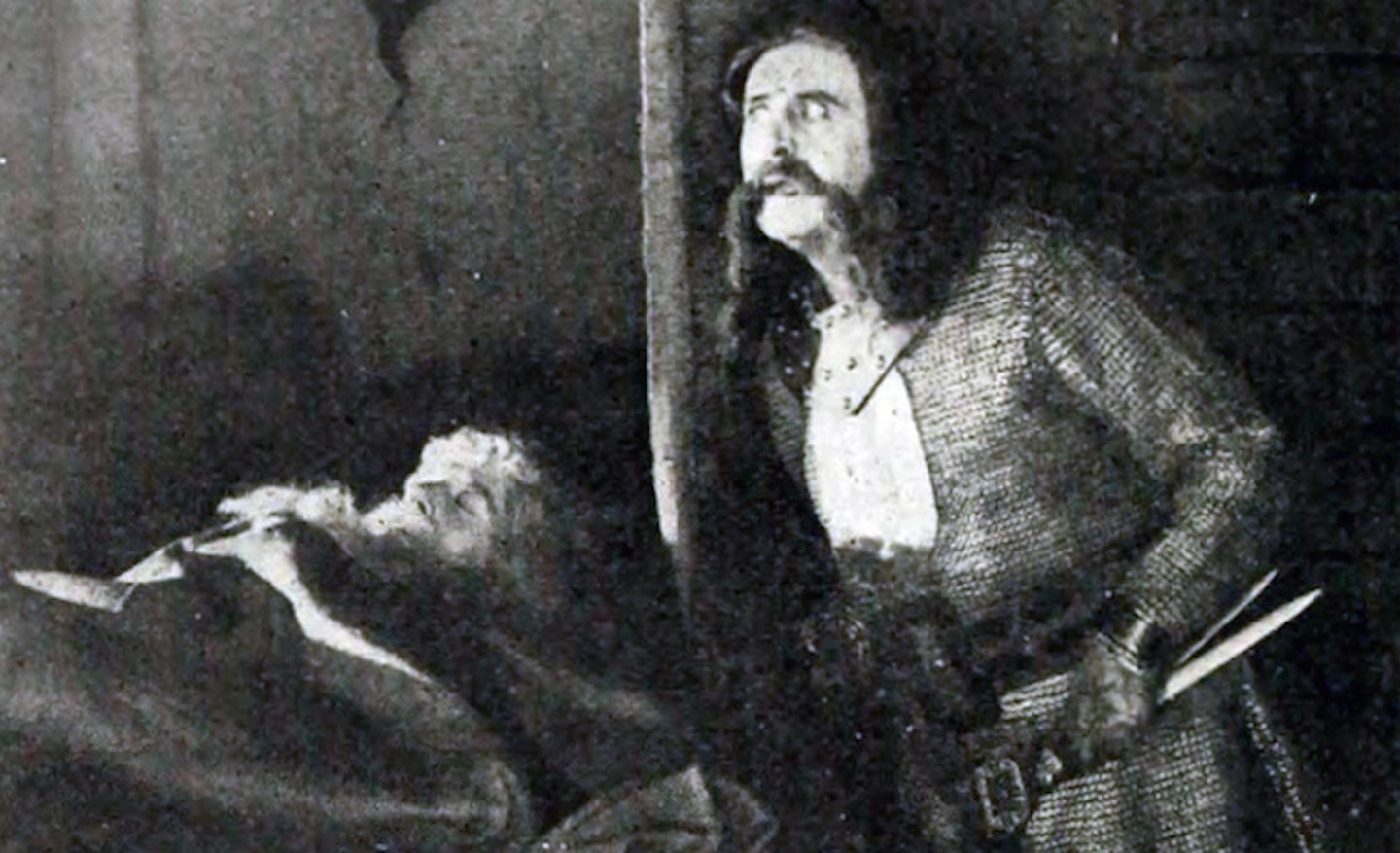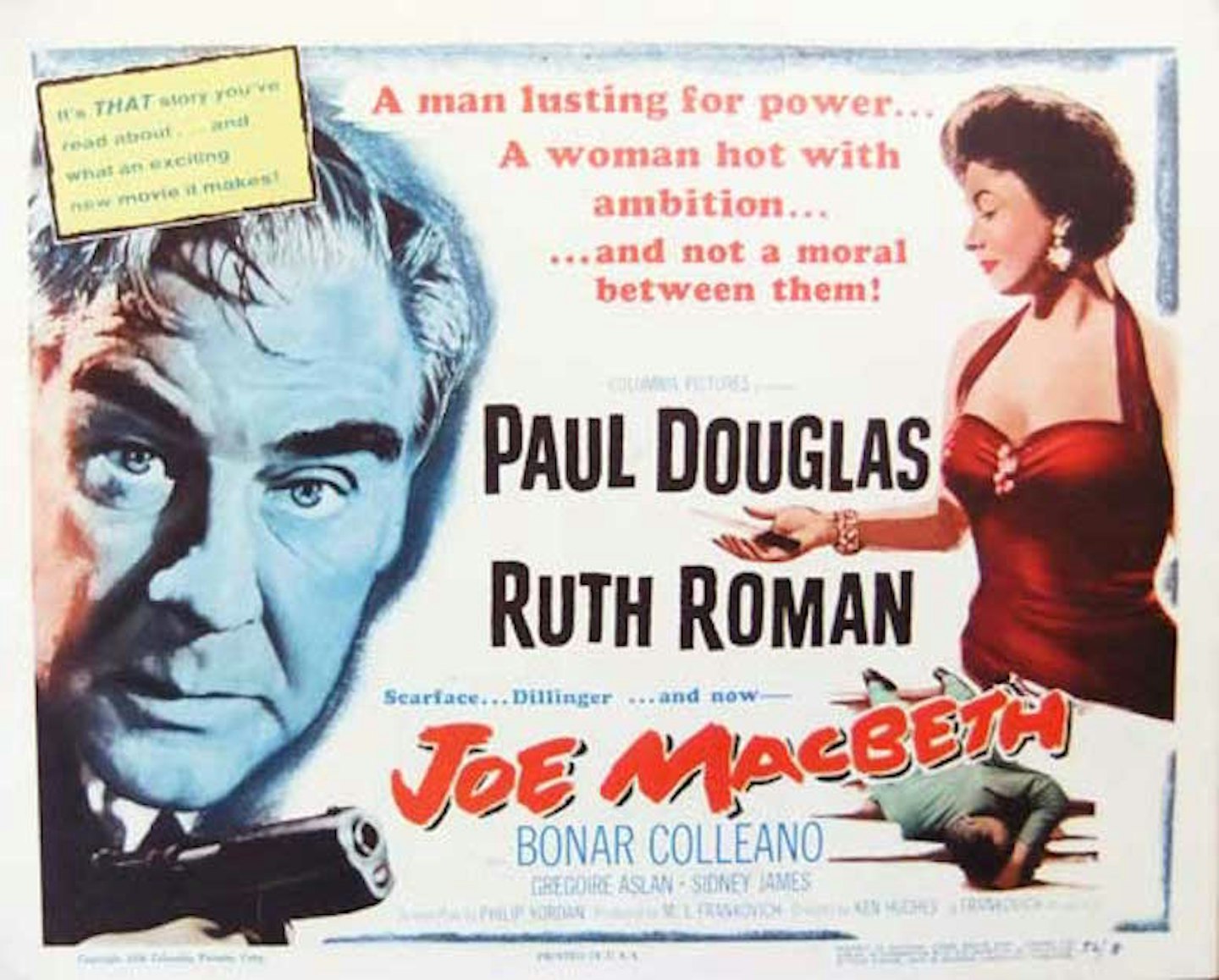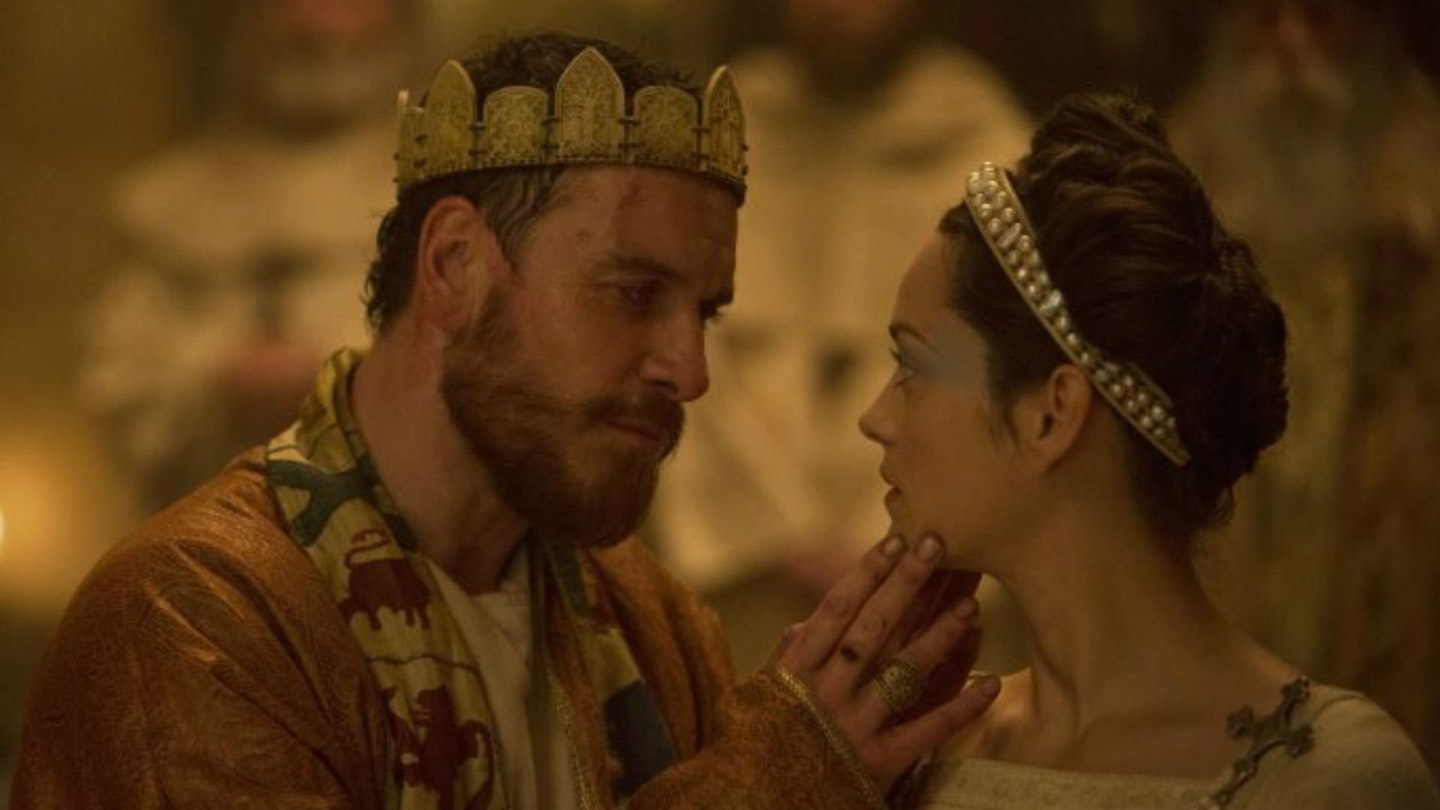By now you'll have seen the striking new trailer for Justin Kurzel's **Macbeth, starring Michael Fassbender, Marion Cotillard, Sean Harris, David Thewlis and Paddy Considine. High time then, for a reminder of some _Macbeth_s past: equally full of sound and fury, but which haven't always hewn so closely to Shakespeare. Look with us into the seeds of time...

Macbeth (1916)
Director: John Emerson
Macbeth: Herbert Beerbohm Tree
The first known screen version of the Scottish Play was an American short called Duel Scene From Macbeth, photographed by Billy Bitzer in 1905. A 47-minute version by Ludwig Landmann reached silent screens in 1913, and three years later, John Emerson unveiled his 80-minute take, under the producing supervision of Birth Of A Nation director D.W. Griffith. Emerson's Macbeth, Herbert Beerbohm Tree, was a noted stage actor of the time who reportedly struggled to adapt to the newfangled medium. Both the Landmann and Emerson films are lost, but the Duel Scene still exists in the Library Of Congress.
Macbeth (1948)
Director: Orson Welles
Macbeth: Orson Welles
Orson Welles envisioned his fifth film as director as "a perfect cross between Wuthering Heights and The Bride Of Frankenstein". With typical bombast and presumption, his adaptation actually adds a new character to the story: the Holy Man recites the prayer of St. Michael and was intended to play up the clash between old and new religions. Welles also bulked up the role of the witches, plundering his previous theatre version Voodoo Macbeth, which he'd staged with an all-black cast. Donalbain is missing, as are most of Duncan's scenes, but Welles seized the opportunity for a cinematic presentation, giving screentime to the final battle that, in the play, happens offstage. The film wasn't a critical or financial success for studio Republic - better known for Roy Rogers Westerns - but Welles returned to Shakespeare for Othello (1952) and the Falstaff-based Chimes At Midnight (1965). His Macbeth has been reassessed as a classic since, but his accent doesn't get any better.

Joe Macbeth (1955)
Director: Ken Hughes
Macbeth: Paul Douglas
Ken Hughes - later to direct Chitty Chitty Bang Bang and contribute to the chaotic 1967 Casino Royale - was behind this British-American noir Macbeth, shot in the '50s but set in the '30s. Dunsinane becomes the criminal underworld, with Joe Macbeth assassinating his crime boss and rising through the mob ranks aided by his scheming wife, Lily Macbeth (Ruth Roman). There's no Malcolm or Macduff, so Fleance (here called Lennie) becomes the principal thorn in Macbeth's side. Banquo becomes Banky and is played by Carry On legend Sid James. "I dreamt last night of three weird sisters, hyuk hyuk hyuk," he doesn't say.
Throne Of Blood (1957)
Director: Akira Kurosawa
Macbeth: Toshirô Mifune
Akira Kurosawa wrote this brilliant collision of Shakespeare and the Noh theatre, but hadn't initially planned to direct it, until he was persuaded by studio Toho, which wanted its biggest name at the helm of an obviously costly production. Birnam Wood becomes Cobweb Forest, Dunsinane Cobweb Castle, and Macbeth General Washizu, but for all the inter-cultural translation, Throne Of Blood is still thrillingly recognisable. From its eerie beginning, in which mists on a blasted heath transform ruins into a standing fortress, to its thunderous climax, where an understandbly terrified looking Mifune endures a hail of real arrows, Throne Of Blood remains one of the greatest screen _Macbeth_s, almost 60 years later.
Macbeth (1971)
Director: Roman Polanski
Macbeth: Jon Finch
Welles' was grandiose and Kurosawa's was spooky, but Polanski's Macbeth goes all-out for the medieval viscera. When three witches on a heath become a hundred naked old women in a cave, you know you're in for an ordeal. This was the director's first film following the murder of his wife Sharon Tate by Manson acolytes, and his nihilstic state of mind is obvious: at the end, in a scene not from Shakespeare, Donalbain (Paul Shelley) goes to visit the witches, suggesting that the whole morbid business is an unbreakable cycle. Otherwise though, it's a pretty faithful adaptation, aside from the hugely expanded role of Ross (John Stride). Keith Chegwin is Fleance. He shall be on Multi-Coloured Swap Shop hereafter.
Men Of Respect (1991)
Director: William Reilly
Macbeth: John Turturro
Essentially Joe Macbeth again, this is a modern-day crime drama, with Turturro the Macbeth-ish hitman who climbs the mob's ranks by killing his boss. The clip above just about gets us to his encounter with this film's witch cipher. Dennis Farina gets the Banquo role (Bankie again), with Peter Boyle as Macduff (Duffy), Stanley Tucci as Malcolm (Mal), Carl Capotorto as Donalbain (Don) and Rod Steiger as Duncan (err, Charlie).
Scotland, PA (2001)
Director: William Morrissette
Macbeth: James LeGros
Another modern-day version (more-or-less), this time repurposed as a dark comedy set in a '70s fast food restaurant, Duncan's Cafe. Joe McBeth (James LeGros) gets passed over for promotion... and confusion now hath made its masterpiece. Christopher Walken is cop Ernie McDuff, and Banquo becomes Kevin Corrigan's fry cook Anthony Banconi (who everyone calls Banko). The three witches are hipsters.
Macbeth (2005)
Director: Mark Brozel
Macbeth: James McAvoy
This instalment of the BBC's ShakespeaRe-Told series takes the same tack as Scotland, PA and sets the dark doings in a restaurant. The similarity pretty much ends there though. This establishment has three Michelin stars, for one thing. James McAvoy's Macbeth is a sous chef, with his lady Ella the Maître d'. Owner and celebrity chef Duncan (Vincent Regan) takes all the credit for Macbeth's excellent work, which irks Macbeth and his fellow chef Billy Banquo (Joseph Millson). Duncan's son Malcolm (Toby Kebbell) is deemed not fit to take over the business, and Macbeth is given ideas by three mysterious dustbin men. But he needs to watch out for head waiter Peter Macduff (Richard Armitage). The series also set Much Ado About Nothing in a TV newsroom; The Taming Of the Shrew in Westminster; and A Midsummer Night's Dream in a theme park.
Macbeth (2006)
Director: Geoffrey Wright
Macbeth: Sam Worthington
The director of Romper Stomper and Cherry Falls here aims for some of Baz Luhrmann's Romeo + Juliet action, with mixed results. It's another gangster setting, this time with Australian accents, but actually keeping Shakespeare's names and - largely - original language. Horses become Motocross scramblers; the witches are kinky schoolgirls; and Birnam Wood becomes logging company Birnam Timber. Donalbain is missing from the adaptation, but Macbeth (Sam Worthington) and his Lady (Victoria Hill) gain a dead son who overdosed on cocaine.
Macbeth (2010)
Director: Rupert Goold
Macbeth: Patrick Stewart
Goold adapted his own stage version from the Chichester Festival (and later the West End and Broadway) for BBC4, employing the same cast and the same military-dictatorship setting based on Stalin's Russia. The film was shot entirely on location in the unique warren of eerie tunnels beneath Welbeck Abbey in Nottinghamshire: not unlike a military bunker, but with a ballroom. Aesthetics aside, it's a faithful adaptation that, at almost three hours, doesn't suffer from much excision. But the witches - here reimagined as nurses in fetish uniforms (sick, my lord) - are a constant, unsettling presence.
